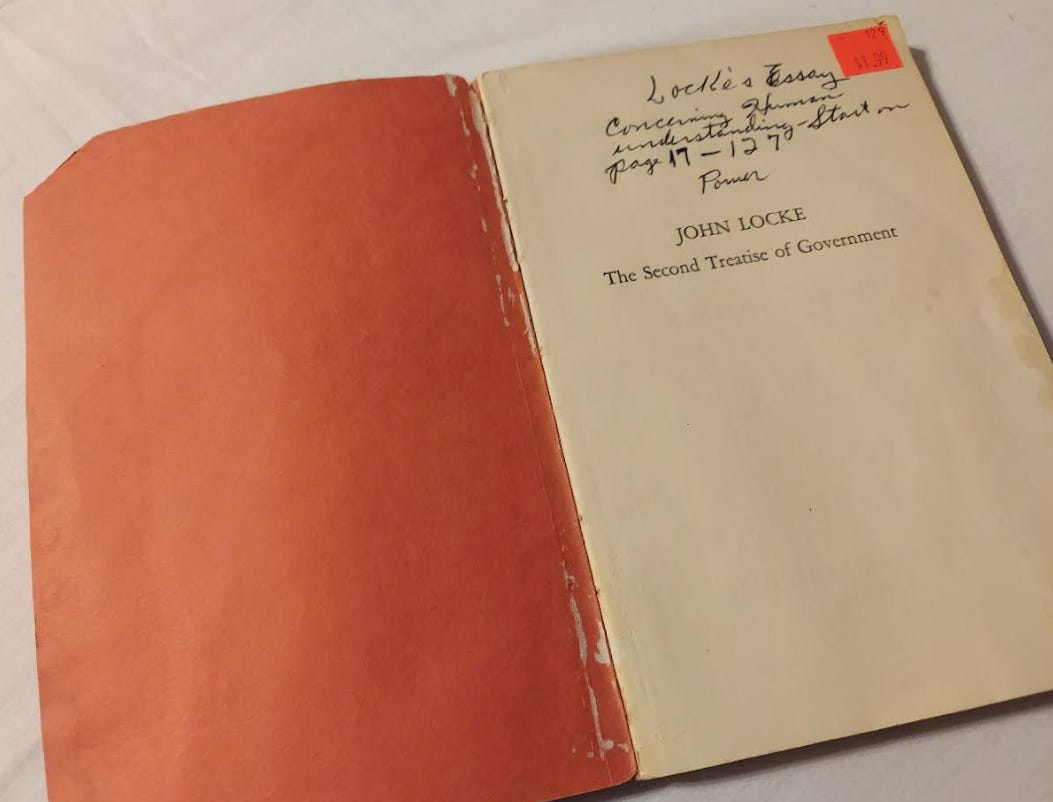The Wizards of Bullshit
Our language police have overlooked the most offensive speech of all: postmodern gibberish.

This post is by Contributor Timothy Wood.
The philosopher Daniel Dennett once said that philosophy is, among other things, the art of figuring out when words get in the way of our meaning. If that’s the case, we are in dire need of more philosophy. Civil society depends on dialogue. Dialogue depends on shared understanding. But there are some, particularly on the scholarly left, who have found a way to hijack language, hollow it out, replace it with sterile, jargony, truly meaningless drivel, and then demand respect for their contributions to humanity.
What happens in the academy sadly doesn’t stay there. The kind of unreadable, word salad drek found in the likes of Michel Foucault’s History of Madness (1961), Jean Baudrillard’s The Perfect Crime (1993), and virtually anything ever written by Judith Butler, eventually evolves, combines with the radical politics du jour, and then spreads into other areas of society. It makes landfall in the education system, and then proceeds into journalism, nonprofits, the corporate world, the diversity industry, and even medicine and beyond. More than that, it seeps into the discourse itself; into how we discuss issues and ideas, and how we engage with one another. That’s bad for everybody, so long as we want to continue living as a thinking species. Educated people, especially those left-of-center, need to permanently lose their patience with this bizarre newspeak that uses language as though the point were not to communicate.
I recently came across what can only be described as a work of postmodern fan-fiction. “Political Alienations, Echo Chambers, Online Shitstorms and Simulated Discourse in the Rhizomatic Transparency of Postmodernity.” This is a thing someone wrote, presumably a human. It is the single stupidest thing I have ever read — and I’ve read the Book of Mormon (1830).1 Over 5,700 agonizing words, its author pens gems like “the pornographic exhibition of echo chambers”, “everything is connected, like on a map”, and “maximum alienation: distance in closeness and closeness in distance.”
Picking on the post of some rando might seem a bit unfair until you realize that it’s hardly distinguishable from the real thing. “The fear before the absolute limit of death becomes interiorised in a continual process of ironisation” (Foucault). “Were it not for appearances, the world would be a perfect crime, that is, a crime without a criminal, without a victim and without a motive. And the truth would forever have withdrawn from it and its secret would never be revealed, for want of any clues [traces] [sic] being left behind” (Baudrillard2). “The move from a structuralist account in which capital is understood to structure social relations in relatively homologous ways to a view of hegemony in which power relations are subject to repetition, convergence, and rearticulation brought the question of temporality into the thinking of structure, and marked a shift from a form of Althusserian theory that takes structural totalities as theoretical objects to one in which the insights into the contingent possibility of structure inaugurate a renewed conception of hegemony as bound up with the contingent sites and strategies of the rearticulation of power” (Butler3).
This above-mentioned “Rhizomatic” post is drawing from Gilles Deleuze, who’s considered by the Stanford Encyclopedia of Philosophy to be “one of the most influential and prolific French philosophers of the second half of the 20th century.” This is a “respected academic” — one of the guys postmodernists study to better learn how to say nothing in the most elaborate way. Deleuze’s co-authored book, A Thousand Plateaus (1987) (which sounds like an unreleased Metallica album), is a master class in inanity. Make it through the introduction and you’ll get what I mean. We are told to consider everything as a rhizome. To be clear, a rhizome is a fucking potato, but rhizomes are so hot right now. We are assured that rats, wasps, and viruses are rhizomes. To be clear, a rat is not a rhizome. One of these things is a rat, and one of them is a fucking potato. Then we get into the nature of a map, and how it is also a potato.
“The map does not reproduce an unconscious closed in upon itself; it constructs the unconscious. It fosters connections between fields, the removal of blockages on bodies without organs, the maximum opening of bodies without organs onto a plane of consistency. It is itself part of the rhizome.” (p. 12)
This thing — which sounds like the product of forgetting which bag had the cocaine and which had the mushrooms — is supposed to be a paragon of philosophy. It is still read and debated in the halls of academia.
“The apex of the vortex…”
That’s actually not Deleuze; that’s James Franco in Pineapple Express (2008). I’m guessing most people couldn’t tell the difference, because it has the same amount of substance. It’s a funny movie, but whatever you’re shooting for in your philosophy, you should aim higher than a film where James Franco gets stoned with Seth Rogan and a caterpillar.
Language is a proxy for meaning, not meaning itself. Watch the person at the construction site or airport communicate non-verbally in a routine way everyone implicitly understands. Holding one arm outstretched to the side and waving the other toward me means “come forward and turn to the left.” At these points, never do we confuse the symbol for the meaning. We don’t consider that there is something intrinsic or metaphysical about moving your arm in a particular motion. But we often find someone who throws around terms like “recapitulatory” in a paper, and we assume it must mean something, otherwise there wouldn’t be a word for it. They’re using big words we have to look up, so they must be smart. “Recapitulatory” just means “something that repeats.” It’s where the common word “recap” comes from. If I give you a “recap” of the big game, I am repeating what happened when Kentucky lost to Kansas in the second round of the NCAA tournament.
Put yourself in the mind of a child. I have a six-year-old handy, and so I get to do that a lot. It’s easy to forget what it’s like to be a kid. I say a word she doesn’t know, and she immediately recognizes it as unfamiliar and asks the meaning. I forget how often this happens. She’ll throw in a word like “occupation” instead of “job” and it catches me off guard. Mostly, I am dad, arbiter of truth. I explain things like why a shrub is not a tree. I point to something concrete. That’s a shrub because it’s small and it never gets much bigger. That’s a tree because it grows tall. We have words to tell them apart because of things you can touch and see.
There’s a decent argument that language isn’t merely “the stuff of”, but is the prerequisite for complex thought. That gets fuzzy when you include math, but it’s hard to learn algebra without language. Language lets us put tags on concepts, like a collar on a lost dog. But there is a point where language outstrips meaning, and we tend to roll with it, because every word we’ve encountered normally has meaning: cat, dog, tree, shrub, recapitulatory. But the heuristic only goes so far and betrays us once someone learns to manipulate it.
When terms like “The Egregious Self” are spoken with confidence, we should all be suspicious that the speaker may be merely using words to define other words in a series of uncashed checks. There’s actually no such thing as The Egregious Self — I made it up just now. But I’m Capitalizing Every Word. I used a big word: egregious. I used a slightly mystical term: self. I could write a whole paper on this made-up thing:
The Egregious Self manifests as reticulating tensions between co-inhabited social worlds, and the coalescing of performative expectations as they intersect with the persistency, and comorbid in their determinate trajectory, of life-essential and socially-permissible functions.
In plain English, what I described is the awkward moment when a guy gets off work, stops for milk, and bumps into a friend while they’re wearing their uniforms. I first came up with the dude buying milk, and then described it in the most convoluted way possible to make it sound important.
This isn’t new. In the 1990s, mathematician Alan Sokal published intentional nonsense in peer reviewed postmodern journals as a bit of a joke. Then some folks came back and did it again in 2017 and 2018. It really is that easy, and the practitioners really are so enamored with their needlessly archaic terminology, endless stretched similes and metaphors, and otherwise pompous multisyllabic vomit, that they can’t tell the difference between their craft and deliberate gibberish. As a grad student, I scheduled a meeting with the chair of the Physics Department at the University of Kentucky, because people were publishing in peer reviewed journals about how quantum physics explained social inequities. It was so staggeringly stupid I was literally at a loss for words.
There’s a place for respecting what you don’t understand. When I was young, I found a used 1952 copy of John Locke’s The Second Treatise of Government (1689). I presumed John knew more than me. When I saw an unfamiliar word, I presumed John was correct, and the misunderstanding was mine. I was the six-year-old and John was the adult. Again, the heuristic works most of the time, but it breaks down at a certain point.
Civil society runs on dialogue and dialogue runs on shared understanding. This is a place where the left abrogates its duty of “speaking truth to power” and “being the change.” We stacked the pen against the sword and the pen is supposed to win, but it’s hard to do that when the pen is perpetrating crimes against language.
If the left wants to resonate, they need to stop industrializing nonsense. Are you trying to accomplish tangible progress, or are you just trying to get published and impress your peer group? There’s no part of obscurantism that actually helps society. What you’re doing is empowering the people you disagree with on the right, because they can point to transparent imbecility and then write off everything else you say. It’s up to those of us either on the left or not on the right to see bullshit, recognize bullshit, and call it bullshit. And do it loudly. What’s missing on the left isn't intelligence, but the boldness to call foul on the pretentious, sophomoric, disingenuous, deliberately convoluted and elitist gobbledygook its most educated members excrete into the world.
See also: “The Critical Race Theory Debate is Dripping In Bullshit”
Subscribe now and never miss a new post. You can also support the work on Patreon. Please consider sharing this article on your social networks, and hit the like button so more people can discover it. You can reach me at @AmericnDreaming on Twitter, or at AmericanDreaming08@Gmail.com.
They only allowed religious books during basic training in the Army, and the Book of Mormon was one I hadn’t read. Joseph Smith tried and failed to write like Paul, but to be fair, Paul was a pretty good writer.
This isn’t out of context; it’s the first sentence of The Perfect Crime.
A 94 word sentence that says nothing. One wonders if Judith Butler was abused by words as a child and bears a lifelong grudge against them.








While there is a lot of Truth to what you say about postmodernist text, I think you have missed the mark here in many ways....I will write some more later if I remember, on mobile at the moment.
What happens when your social movement becomes run by college grads, for college grads. Keeping the riff-raff out is a feature; they can be instructed by their betters at the next DEI seminar.